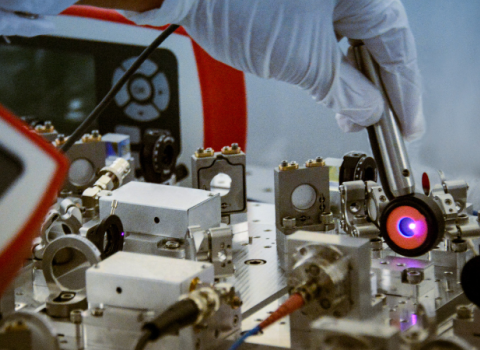It has now been confirmed that KTH will be the coordinator for a new quantum research project. SEK 100 million over 30 months will be used to bolster safe data communication over short and long distances.
The new project is called National Quantum Communication Infrastructure in Sweden (NQCIS), and alongside KTH it also involves Chalmers, Linköping and Stockholm universities. The consortium also includes the companies Ericsson AB, Quantum Scopes AB and quCertify AB. The project is part of a broader European Commission initiative within the Digital Europe Programme, and is funded by the EU as well as Vinnova and the Wallenberg Centre for Quantum Technology – WACQT.
Critical in modern data communication
Within the framework of NQCIS, the researchers will test and deploy quantum key (see fact box) distribution systems tailored to the specific needs of Sweden. This includes validation of different implementations to identify the most effective solutions that meet Sweden’s needs for secure communications in metropolitan areas, long-distance networks and terrestrial to satellite links.
“Cyber security has become a critical aspect of modern data communication, and needs will only increase with the development of quantum computers and their future ability to break the most sophisticated, secure encryptions that are used. Quantum encryption uses physical properties to establish secure communication. The technology makes it possible to see whether someone is trying to intercept the communication,” says Katia Gallo, Professor at KTH’s Nanostructure Physics division.
Promoting academic-industrial collaboration
Gallo is one of the researchers involved in the project. The aim of NQCIS is to create a national community focused on advancing quantum technology, and foster collaboration between research partners and industrial companies, ranging from Ericsson to emerging spinoffs.
“Through this project, Sweden and all EU Member States will build secure quantum communication opportunities in order to strengthen shared capacity in quantum communications, cyber security, and industrial spearhead capacity and expertise. NQCIS will establish a close collaboration with national research environments in the field, and with a variety of companies, the aim being to shape the potential for large-scale implementation of secure quantum communications in the future, which reaches all of Sweden and can be connected with neighbouring countries,” says Gallo.
NQCIS includes a research centre in Stockholm at the AlbaNova University Center, which is open to academia and industry and aims to support education and teaching in Sweden. The research centre will be at the core of user case development on the metropolitan network, and of quantum-secured long-distance links, which extend from Stockholm to Linköping and also include communication in open networks.
This article was first published on 24 April by KTH.





 A unique international forum for public research organisations and companies to connect their external engagement with strategic interests around their R&D system.
A unique international forum for public research organisations and companies to connect their external engagement with strategic interests around their R&D system.